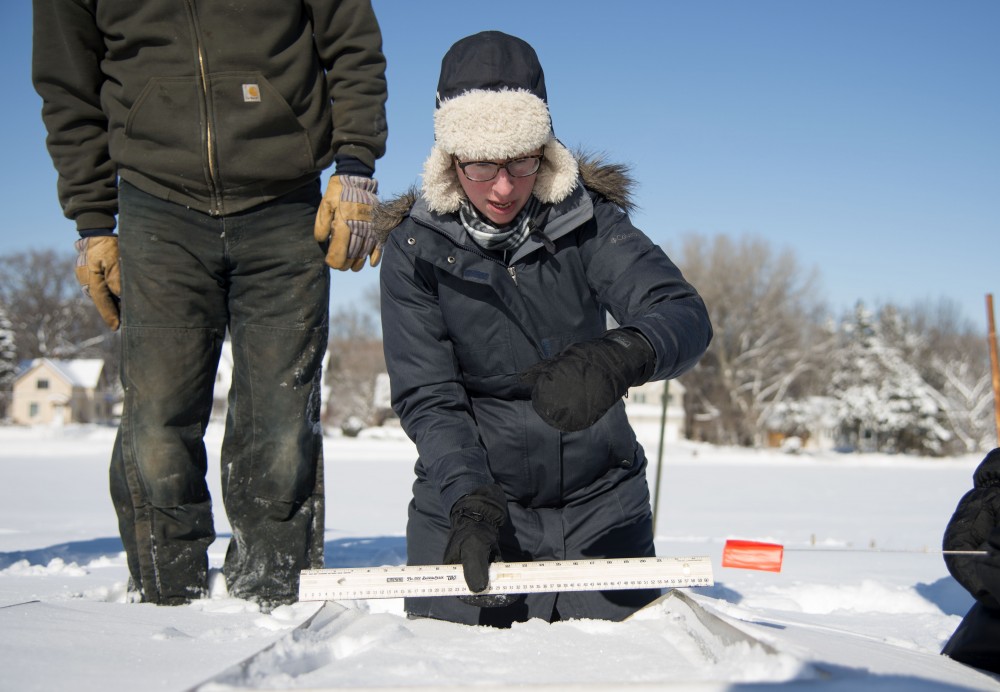Melissa Wilson’s job may seem crappy to some people, but the University of Minnesota “manure prof” loves the work she does.
A research lab on the St. Paul campus is currently being renovated for Wilson to conduct her strong-scented, manure-related research. The addition of the new lab, which will be completed next month, will aid Wilson in finding ways to help the agriculture industry and the environment through her work with manure.
Wilson is a soil scientist specializing in manure management. She’s also an educator for farmers and agricultural professionals through University Extension. The new manure lab will also allow Wilson to do more sample work and provide additional lab experience for students working on her team.
In her research, Wilson studies using manure as a fertilizer while minimizing the environmental impact from manure nutrients contaminating water systems. Some of her research includes comparing when manure should be applied to certain crops, the consistency of the fertilizer and what animal it should come from.
To help accommodate the strong smell of manure, the lab will have a new exhaust system, said Mike Schmitt, associate dean in the CFANS and University Extension.
“It will smell in there,” Schmitt said.
Schmitt was the last person to serve as a manure specialist at the University. He left the position for an administration job in the early 2000s. The job had been vacant for almost 15 years until Wilson was hired in 2017.
The University opened up the position again because there was demand from Minnesota’s agricultural community and state government for more research on manure management, said Carl Rosen, head of the University’s Department of Soil, Water and Climate.
“As farmers are entering the business, they need to be educated and trained on how best to handle the manure,” Rosen said. “They rely on this University for up-to-date research and educational programs on how to manage it.”
Part of Wilson’s work is to reassess current manure management recommendations from the University and see if they need to be updated.

Commercial fertilizers and manure are used to provide nutrients for crops. Nutrients in these fertilizers, such as nitrogen, can go into the ground and affect the quality of groundwater, rivers and lakes.
“Nutrient management is becoming more and more important because of the way it can affect our water supplies,” Rosen said.
One of the keys to reducing the environmental impact from fertilizers like manure is to not use more fertilizer than crops can absorb. Extra fertilizer can seep into the ground, Schmitt said. Because of this, Wilson studies how much manure crops can take in.
“Manure is on all of our farms. It is really important we manage that correctly so we don’t jeopardize natural resources,” Schmitt said.
Growing awareness on social media
On Twitter, Wilson uses the handle @ManureProf. She’s turned to social media to communicate with farmers and agricultural professionals around Minnesota, while having a crap-load of fun.
“When you talk with people about working with manure stuff, the jokes automatically start coming up,” Wilson said. “I learned early on you need to have a sense of humor if you are going to be in this field.”
Wilson has found that Twitter is a good way to get the word out about work she is doing, tweeting information for farmers, with mixing a healthy dose of humor. “He’s dealing with a lot of crap right now” was a joke she made about her postdoctoral student’s work.
“She is having fun with it while advancing public awareness and knowledge about the issue of manure,” Schmitt said.
Earlier this month, Wilson and her lab braved zero-degree temperatures to lay manure in agricultural plots on the St. Paul campus.
Wilson is researching what happens when manure is applied on top of snow. When the snow melts, Wilson wants to see what will happen to the manure.
“The work is stinky at times, but someone has got to do it,” Wilson said.
















